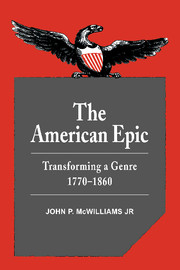6 - The Destroying Angel
Published online by Cambridge University Press: 22 March 2010
Summary
Since the publication of David Levin's History As Romantic Art (1959), the quality and importance of Prescott's History of the Conquest of Mexico (1843) have remained almost wholly disregarded. During the last three decades, when American literary studies have been largely concerned with separable national traditions, the very idea of a “Boston Brahmin” devoting his life's work to sixteenth-century Spanish history without visiting either Spain, Mexico, or Peru, has made Prescott's work seem quaint, stuffily traditional, somehow antinational, and finally unimportant. Such assumptions should be challenged. Against the strident nationalism of the post-Jacksonian era, Prescott sought an American heroic literature within the context of the entire New World; from Boston and Pepperell, he promoted an international republic of letters while transforming old themes into new genres. His distant, derisive perspective upon the Republic (“We 'go ahead' like a great lusty brat that will work his way into the full size of a man”) only broadened his consideration of the possible betrayal of republicanism within the entire western hemisphere.
An indefatigable scholar, Prescott believed that the best preparation for writing history was the study of literature, but he did not consider the Spanish Conquest to be merely a matter of antiquarian interest requiring literary color. Of worldwide historical importance, Cortes's conquest was also a prefiguring of contemporary issues. As a Conscience Whig, Prescott believed the annexation of Texas to be a rationalization for extending the territories of slavery. At the same time, his respect for technological advances and for strong leadership persuaded him that nativist sentimentalizing of the common man could be no source of true progress.
- Type
- Chapter
- Information
- The American EpicTransforming a Genre, 1770–1860, pp. 158 - 186Publisher: Cambridge University PressPrint publication year: 1989



